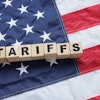
The U.S. tariffs are accelerating the breakdown of hyper-globalization, forcing companies worldwide to rethink their supply chain strategies. As protectionist policies take hold, supply chains are shifting toward localization to mitigate risk and rising costs, according to GlobalData’s Impact of Tariffs on Supply Chains report.
“The uncertainty and unpredictability of U.S. tariff policy is discouraging companies from making any long-term investment decisions. Instead, most companies intend to wait for the tariff situation to stabilize before finalizing any strategic shifts to their supply chains,” says Carolina Pinto, strategic intelligence analyst at GlobalData.
Key takeaways:
· Even if the U.S. tariff rate ends up being lower than previously announced in April, an average 10% tariff rate on most U.S. imports will force companies to reconfigure supply chains.
· Over the next five years, all major economies are expected to try to reindustrialize and stimulate domestic demand. Trade restrictions and stimulus packages will incentivize, or even force, companies to reconfigure their supply chains. There will be a shift toward localizing supply chains to avoid the financial and operational penalties associated with offshoring production.
· The pharma sector within the foreign direct investment (FDI) figures shows the highest value of U.S. inbound FDI in Q1 2025.














![Pros To Know 2026 [color]](https://img.sdcexec.com/mindful/acbm/workspaces/default/uploads/2025/08/prostoknow-2026-color.mduFvhpgMk.png?ar=16%3A9&auto=format%2Ccompress&bg=fff&fill-color=fff&fit=fill&h=135&q=70&w=240)



